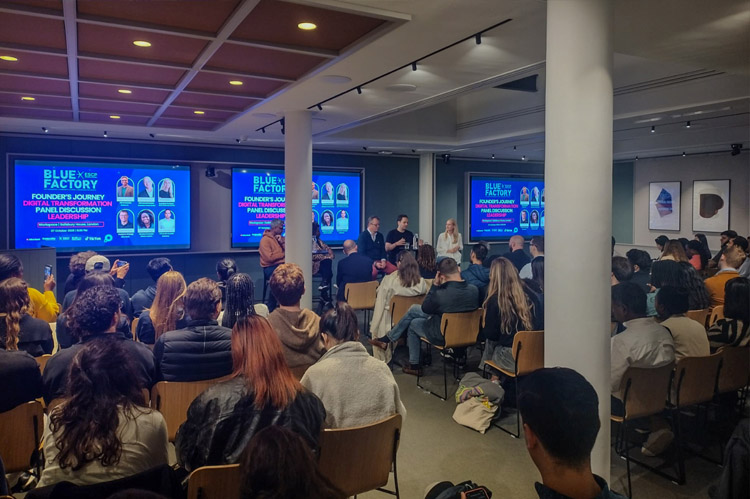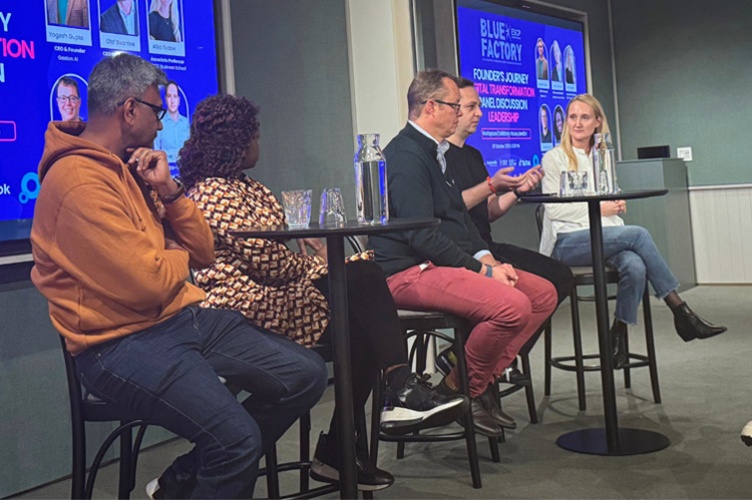ESCP’s Blue Factory London, in collaboration with Startup Networks, a startup community, hosted corporate innovators, start-up founders and thought leaders.
The event was a chance to exchange ideas and shape a shared vision for the future of business.
With the global digital transformation market projected to grow by an average of 28.5% each year between 2025 and 2030, and SMEs accounting for 99.85% of UK businesses in 2025, the conversation around leadership, digitalisation, and adaptability has never been more timely.
This event featured an inspiring leadership talk from Olaf Swantee, a CEO turned investor at Swantee-Invest and ESCP Alumnus, who shared his personal journey and many practical tips on navigating leadership challenges with the audience. The talk was followed by an expert panel discussion moderated by Alisa Sydow, Associate Professor of Entrepreneurship and Innovation at ESCP Business School. Speakers from Allica Bank, Gaston AI, Reflexivity, and Athena Leaders explored digital transformation trends and how today's leadership combines vision and resilience with the adaptability needed to navigate constant change.

To find out more, we spoke with Harry McDonough, UK Senior Manager of the Blue Factory startup incubator and Co-Founder of Startup Networks, and Prof. Alisa Sydow, who shared their insights on what leadership and transformation mean in today’s fast-evolving digital landscape, particularly for early-stage startups navigating growth and uncertainty.
What qualities do you think define effective leadership, specifically in startups, where uncertainty and rapid change are constant?
Alisa Sydow: Everyone knows that being a founder is very challenging, as you wear many different hats and handle a lot of different tasks and responsibilities. Therefore, I believe that one key element for effective leadership is being authentic. You will never ever do everything right, and you won't always have all the right answers. So, be humble and authentic with your team. And more importantly, build a team around you that feels empowered to be their own leaders, especially as you work to scale your business, and do everything from scratch.
Harry McDonough: I agree. In fact, most startup leaders are thrown into leadership roles and have to learn and adapt on the go. The best ones stay calm under pressure, make quick but thoughtful decisions, and aren’t afraid to change things up if needed. They build trust by being open with their teams and giving people the space to take ownership, make mistakes, and learn as they go. I also noticed that in fast-moving environments, resilience and emotional awareness are essential as people look up to you for stability and a sense of shared purpose.
What lessons can early-stage startups take from corporates about scaling and operations, and what can corporates learn from startups about innovation and agility?
AS: During the event, we saw once again that corporates are quite different from startups. However, there are topics that remain relevant in every type of organisation, no matter its size. For example, your company's culture and values are universally important, as they act as a strong glue between employees, guiding their everyday activities and behaviours. This focus on building a certain culture and environment in which employees can thrive is something that startups can learn from corporates.
HM: They can also learn the importance of building strong operational foundations, with clear processes, scalable systems, and structures that can grow with the business. As Conrad Ford from Allica Bank noted at our event, successful scaleups focus on hiring top talent, while many corporates compromise quality to meet quotas. Startups should therefore hire more intentionally, bringing in talent who truly fit their mission to build strong teams and achieve sustainable growth. On the flip side, corporates can also learn a thing or two from startups on how to stay agile, challenge assumptions, and encourage their teams to experiment to keep innovation alive, even at scale.
From your experience, what are the biggest challenges for startup founders and entrepreneurial leaders when implementing digital transformation, and how can they overcome them?
AS: One of the biggest challenges lies in screening and understanding which technologies should be implemented in your startup. We are at a stage where you cannot jump on every next big trend or opportunity to digitalise your processes. If you were to do so, you would likely reach a level of continuous change that is simply not sustainable. Therefore, it becomes more and more important to evaluate and select the right technology to implement, ideally at the right time as well.
HM: Exactly. There is the self-awareness challenge, too, in knowing when and how to implement change. As Armenak mentioned, “use Excel spreadsheets until you can’t anymore” before investing in complex systems. Many startups lack the budget, time, or expertise to roll out full-scale digital tools, so they must prioritise practicality over perfection. The key is to adopt digital solutions that truly fit their current needs, and then build gradually, ensuring the team can adapt. You can only achieve sustainable transformation when you grow into technology, not when you rush to adopt it before you’re ready.
What insights from the event do you think are most valuable for entrepreneurial leaders today?
AS: For me personally, the biggest takeaway is that no matter how digital we become or how tech-driven we are, in the end, it always comes down to people and how they work together. Thus, it is important to keep that in mind and to remind yourself that, ultimately, we do business with people, even if we feel overwhelmed or led by new technologies.
HM: For me, one of the most valuable takeaways is the importance of learning from others. Speaking with influential leaders in your network can offer fresh perspectives, shortcuts, and lessons that save time and resources. Also, don't dwell on mistakes - setbacks are part of the entrepreneurial journey and often lead to stronger strategies. Finally, self-awareness is crucial, including knowing your strengths, limitations, and when to seek help. This will guide you to better decision-making and sustainable growth.
We would also like to thank all the panellists who shared their expertise and insights during the event, and continue to support and mentor student and alumni entrepreneurs in the ESCP network:
- Conrad Ford, Chief Product & Strategy Officer at Allica Bank
- Yogesh Gupta, Founder and CEO of Gaston AI and ESCP Class of 2019 alumnus
- Armenak Mayalian, CTO and Co-founder of Reflexivity and ESCP Class of 2011 alumnus
- Naily Makangu, Director and Founder of Athena Leaders and Founder Institute.
Their experiences and insights offered invaluable perspectives on how entrepreneurial leaders can navigate digital transformation strategies and scale their ventures effectively. As the discussion around leadership and digital transformation continues to evolve, adaptability, willingness to embrace change, and the ability to learn and grow will remain at the core of any company’s success, as it prepares for future transformations.
Curious to join the conversation and attend our next event? Get in touch with Harry McDonough for more information.
Campuses
